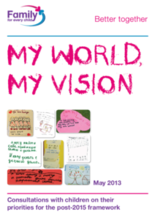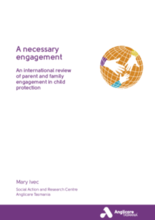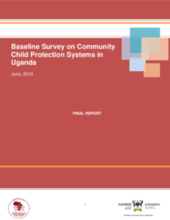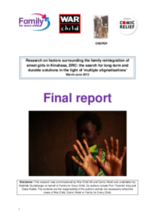Demographic Data
|
Sources: World Bank, UNICEF, UNDP HDR 2015, DHS 2013 |
Displaying 12701 - 12710 of 14580
This country care review includes the care related Concluding Observations adopted by the Committee on the Rights of Persons with Disabilities as part of its examination of Tunisia’s initial report adopted by the Committee at its fifth session.
This paper provides details of research into the gatekeeping system in Bulgaria for children under three and examples from recent Bulgarian and international practice. It suggests that gatekeeping could benefit from a social development orientation including activities to combat poverty and promote social inclusion through supporting community and family strengths.
This article describes the historical background and current situation of the child welfare system for children without parental care in Poland.
The Millennium Development Goals will come to an end in 2015 and discussions are currently taking place on what framework will replace them. Children’s participation is crucial to these discussions. Between July 2012 and March 2013, members of Family for Every Child consulted with children living in seven different countries. This report summarizes the main findings that emerged from these consultations.
This report provides a review of international and national models of engagement, support and advocacy for parents who have contact with child protection systems. How statutory child protection systems engage with parents ultimately affects the outcomes for children, including safety, permanency and wellbeing. While social work practices that emphasise people’s self-determination and strengths are recognised as fundamental to eliciting change in parents when care standards have faltered, there is widespread acknowledgment of the struggle child protection authorities have to meaningfully engage parents and families.
While many migrants and asylum-seeking children may try to reach Australia, they often spend months or years caught in Indonesia.
This report describes the process, findings and recommendations of the baseline survey for the project titled, “Building and Strengthening Community-Based Child Protection Systems in Busoga and Acholi sub-regions” commissioned by ANPPCAN. The baseline survey was intended to establish the status of project indicators so that the information obtained can inform the implementation of project activities.
This paper presents an examination of the linkages between education and the deinstitutionalization of children in Azerbaijan. The paper explores the role of education in social policy and its interplay with economic policy; underlines the links needed between deinstitutionalization, inclusive education and alternative services; and examines how child protection can be understood in the context of inter-Ministerial responsibilities and coordination.
This paper was submitted to the Inter-Agency Task Team (IATT) on Children affected by HIV and AIDS in June 2013. It presents findings from a study commissioned by the IATT.
This research looked at the factors affecting the family reintegration of girls in the Tshangu district of Kinshasa (DRC), an operational zone of the local NGO OSEPER, a partner of War Child for a 3-year project, seeking to address the needs of street-connected girls, including family reintegration.







